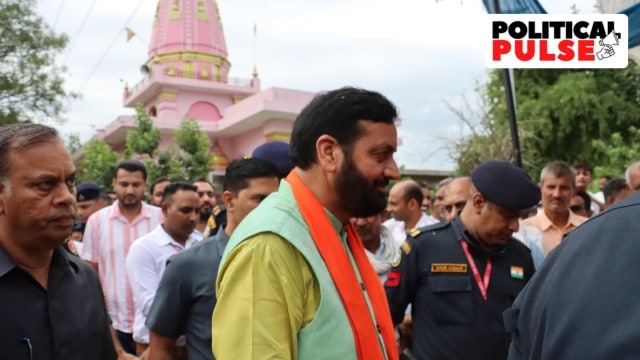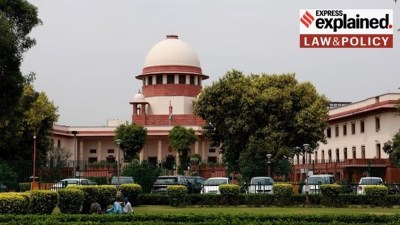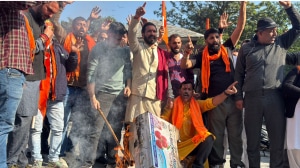IN ITS VERY first Cabinet meeting after being re-elected to power for the third time, the BJP government in Haryana took a decision to implement the apex court’s August order empowering states to go ahead with sub-categorisation within the Scheduled Castes for the purpose of reservations.
Several Dalit groups, excluding those who work in the leather industry, have been seeking a quota within the overall 20% quota for SCs, to help them better avail the benefits of reservation in government jobs in Haryana.

After the Cabinet decision, Haryana Chief Minister Nayab Singh Saini said: “Our government has honoured the order of the Supreme Court.”
In the recent Assembly elections, the BJP succeeded in splitting the Dalit vote, beating the Congress narrative that the Modi government would change the Constitution to deny them reservations. The Nayab Singh Saini government’s move could help it further expand its hold, especially on 36 of the more backward groups within the SCs, such as the Valmikis, Bazigars, Sansis, Dehas, Dhanaks and Saperas.
Dalits comprise a substantial 20% of the state’s population, with around 11% of them believed to belong to the above 36 groups.
The Dalits who work in the leather industry, who are seen to have gained the most from the reservation benefits, are a strong support base of the Congress in Haryana in comparison.
On August 1 this year, in a 6:1 landmark verdict, the Supreme Court had allowed the sub-categorisation of SCs in reservations to allow underrepresented groups to enjoy the benefits of quota.
Story continues below this ad
In Haryana, a body called the ‘Dalit-A Mahapanchayat’, headed by Devi Das Valmiki of Jind, has been leading a campaign for a quota within SC reservations for several years. In March 2020, conceding the demand of Dalit groups like it, the Haryana Assembly had passed a Bill creating a quota within the SC quota for a newly designated “Deprived Scheduled Castes” category, for seats in the state’s higher educational institutions.
The 36 communities mentioned earlier fall in this category.
Welcoming the Haryana government’s decision Friday, Valmiki said: “This is a good decision which has been taken after a considerable delay. This decision should have been taken by the BJP government long back as the party had assured sub-categorisation within SCs ahead of the 2009 and 2014 assembly polls too.”
Demanding a similar decision in other NDA-ruled states, Valmiki added that a panchayat held by the Dalit-A Mahapanchayat in Jind in September this year had helped the BJP to victory.
He pointed out that despite their numbers and hence electoral strength, “no one from the Deprived Scheduled Castes has been elected to the Lok Sabha from Haryana since the state came into existence in 1966”. “In the recent Lok Sabha elections too, both the BJP and Congress gave tickets for the two reserved seats to the Dalit community engaged in leather work,” he said. The Congress won both the seats.
Story continues below this ad
Valmiki said the BJP could rectify this by sending a member belonging to the Deprived Scheduled Castes to the Rajya Sabha from Haryana.
In the Assembly elections, the honours between the two parties were more evenly divided. Of the 17 Assembly seats reserved for SCs, Valmi said, “The BJP gave nine seats to the dominant Dalit community, and six won. Eight seats were allotted to the Deprived Scheduled Castes and two of them won. Among the nine Congress MLAs who won from the reserved seats, seven are from the dominant Dalit community and two from the Deprived Scheduled Castes.”
The dominant Dalit group, which has traditionally worked in the leather industry and enjoys a level of affluence, is opposed to the sub-categorisation, calling it a measure to divide Dalits. The president of the Hisar unit of the ‘Dr B R Ambedkar Sabha’, Raghubir Sunda, has called the Supreme Court order “unfortunate”.
“A significant number of government posts out of the 20% set aside for SCs are lying vacant in Haryana with the remark ‘not found a suitable candidate’. The Supreme Court judgment would just increase this backlog for government jobs. More government posts for SCs will fall vacant,” Sunda had The Indian Express.
Story continues below this ad
Haryana was an interested party in the case before the Supreme Court as, in 1994, the then Congress government in the state led by Bhajan Lal had bifurcated the SC quota into groups ‘Block A’, comprising the more deprived Dalit groups, and ‘Block B’, comprising the Dalits working in the leather industry.
In 2006, the Punjab and Haryana High Court quashed the 1994 notification, citing the Supreme Court decision in the E V Chinnaiah vs State Of Andhra Pradesh And Others case in 2004. Devi Das Valmiki claimed that after the 2004 apex court order, “even graduates or postgraduates from our communities did not get enough employment in the state”.

































